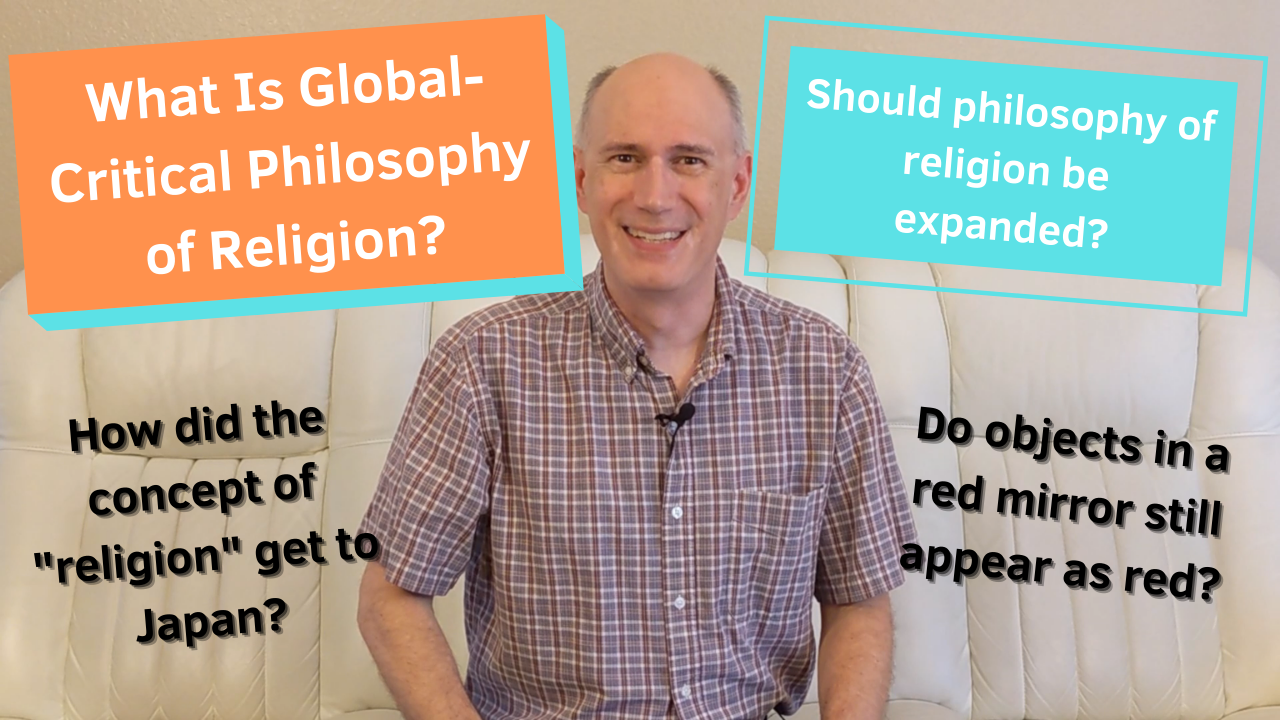05/04/2022 – What Is Global-Critical Philosophy of Religion?

What is global-critical philosophy of religion? How is it different from traditional philosophy religion? Actually, now that I think about it, how many kinds of philosophy of religion are there? Let’s see there’s regular, extra-crispy…uh…extra spicy… Okay, enough nonsense. Roll the intro. This is TenOnReligion.
Hey peeps, it’s Dr. B. with TenOnReligion. This video is closed-captioned here on YouTube and the transcript is available at TenOnReligion.com. If you like religion and philosophy content one thing I really need you to do is to smash that sub button because it really helps out the channel. I also have a ko-fi linked in the description if you’d like to help support the channel and help me keep this baby going.
Okay, for those of you new here, I created this channel almost two years ago to provide introductions to some not always simple topics in religion and philosophy of religion. For a number of years, I’ve been attending some meetings with a group of people who focus on global-critical philosophy of religion. This initiative, or project, was started by three scholars: Tim Knepper at Drake University in Iowa, Gereon Kopf at Luther College in Iowa, and Nathan Loewen from the University of Alabama. They started meeting at the American Academy of Religion in 2015. Their most recent meeting was a mini-conference at Drake University in March 2022 with some participants attending in person and some online. They are in the process of putting together a book or two possibly along with some teaching materials or some sort of teaching manual. I want to talk a little bit about what global-critical philosophy of religion is, provide some examples from their March meeting, make a few comments on what I think, and then see what you think.
The overall goal of global-critical philosophy of religion is to re-think what philosophy of religion could be using global and critical methodologies. For those of you somewhat unfamiliar with philosophy of religion, it has traditionally been heavily Western-centric and thus mostly focused on issues which have arisen within Judaism, Christianity and Islam, but really mostly Christianity. These issues included things like the existence of God or the problem of evil. This is incredibly limiting though, especially in light of our communication and technological advances over the past century. Once philosophy of religion becomes global and critical, however, both the questions and the categories of thinking change. So, what is the global part and what is the critical part?
The global part means two things. First, the inquiry into philosophy of religion must expand beyond a Western understanding of Christianity. Questions and categories of understanding must then be investigated from other perspectives such as East Asian, South Asian and African worldviews. In this sense global represents a geographical and cultural expansion. Second, global means all-encompassing, as in I’m trying to understand this issue globally, like a particular product or service has a global market. We must try to grasp a more complete understanding of philosophy of religion.
The critical part means a few things also. The traditional categories used in the philosophy of religion need to be questioned. In what ways are they still useful? In what ways do they need to be changed in light of this global investigation? How do other fields of study such as the natural sciences or the social sciences affect how philosophy of religion should be understood? We must also try to be continually self-reflective throughout the entire process. In this way global-critical philosophy of religion seeks to diversify the entire subfield of philosophy of religion.
Now, let me give you some examples from their most recent meeting in March 2022. I attended online and, since I haven’t been invited to be a part of their project, I was mostly a fly on the wall not interacting with the group very much, but I can say there was a whole lot of diversity going on. The two days of presentations were broken up into five groups of philosophies of religion: East Asian, African and American (as in Native American), South Asian, Abrahamic, and Contemporary.
The East Asian philosophers represented Confucianism, Daoism, and Buddhism. As an example, Jin Park from American University in Washington DC, whom I’ve met a few times before, mentioned that the concept of religion was introduced to Japan in 1853 when President Fillmore sent a letter to the Emperor of Japan via Commodore Matthew Perry of the U. S. Navy. Since neither the Japanese nor Chinese languages had any equivalent concept, the two parties had trouble understanding each other. What does religion mean? This later led to a long-standing debate regarding the location or genre of Buddhism. Some say Buddhism should be taught as religion because it’s not philosophy while others say it should be taught as philosophy because it’s clearly not religion. But it seems to fit perfectly well in a global-critical philosophy of religion. She also talked about philosophy of religion as it relates to issues of gender, privilege and modes of engagement be it scriptures, religious institutions, or rituals.
The African and American philosophers presented ideas from Lakota, Nguni, and Yoruba perspectives. The fascinating aspect of these is that one cannot really easily differentiate the natural from the supernatural. Thus, philosophy of religion permeates all aspects of life in society.
The South Asian philosophers represented Jain, Buddhist, Hindu, and Sikh perspectives. I really liked Marie-Hélène Gorisse’s presentation on Jainism. She recently moved from Ghent University in Belgium to the University of Birmingham in the UK. For example, when talking about trying to understand the Self, she said, in a red mirror, the objects which are not red still appear as red. That’s deep! [Hold up. Wait a minute. Somethin’ ain’t right.] Likewise, how can a Self full of ignorance see reality for what it really is? She then questioned if there was any relationship to the Jain concept of karma and the Christian concept of sin. Interesting stuff.
Then there were Abrahamic philosophers on Christianity and Islam. Eric Dickman from the University of the Ozarks asked if there should be two different textbooks, so to speak. One for the public and one for the scholars. “Fascinating” [Spock, Star Trek]. This doesn’t seem too different from what I mentioned near the end of my episode on Ernst Troeltsch, who, a century ago, felt that a bifurcation had already occurred between the religion of the people and the religion of the educated.
The last group of contemporary philosophers was broken up into two parts. The first part had scholars representing postcolonialism, process philosophy, feminism, and existentialism. The second part had scholars describing a neuroscience or cognitive science of religion approach and on the conceptual limit of philosophy of religion, or, how to sell this whole idea? Like I said, it was an interesting conference with a whole lot of diversity going on.
Now, what are my thoughts on this whole global-critical philosophy of religion project? I mostly like it. Philosophy of religion does need to be expanded and there’s a lot that can be learned from the perspective of various cultures and religions. My concerns are three. First, at what point does this endeavor become too unwieldy? How many perspectives are too many? I mean, wherever that line is, this group seems to be quickly approaching it.
Second, and this group is all too aware of this issue, at what point are we no longer all talking about the same thing? You see, the problem with using language is that it’s always political. Whichever language is used then gets to choose the categories and then those categories become the dominant ones in the conversation. It was an imperialistic event when President Fillmore sent a letter to the Emperor of Japan and that’s why the word “religion” is the dominant category. If the situation had been reversed, perhaps we’d be talking about a global-critical philosophy of Shinto instead. For example, when Japanese businessmen starting coming to the United States to broker business deals 50 or 60 years ago, they had to learn and speak English. When the same businessmen from America went back to Japan to broker business deals, they still communicated in English. They did not learn Japanese. What does that tell you? When defining and using the word “religion” and its various facets, who gets to decide, and on what basis is that decision made? But that’s exactly what global-critical philosophy of religion is all about. I guess as long as there’s some sort of loose association it still works.
Third, I wish there were more scholars who did comparative work in global-critical philosophy of religion. This model has been successful in comparative theology and I think it would be very fruitful if more folks did this in philosophy of religion also. Instead of having scholars present material monolithically, find creative ways to compare. Jin Park and a few others do this to some extent, but the discipline needs a lot more to jump on that bandwagon. When we start creating categories of understanding at lower levels on very specific issues, like a philosophical comparison of spirit or energy in Confucianism and Native American or African societies, or evil in Buddhism and Christianity, then this would eventually lead to larger categories of understanding through the synthesis. Although in using the word “synthesis” I feel like I’m starting to sound a little too Hegelian for my own personal taste, so I’m going to stop right now.
What do you think about this whole global-critical philosophy of religion project? I’ll leave a link to their website in the description. Leave a comment below and let me know if you think philosophy of religion should be more diversified and why. Until next time, stay curious. If you enjoyed this, support the channel in the link below, please like and share this video and subscribe to this channel. This is TenOnReligion.


